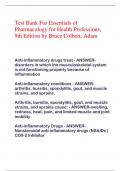Test Bank For Essentials of
Pharmacology for Health Professions,
9th Edition by Bruce Colbert, Adam
Anti-inflammatory drugs treat - ANSWER-
disorders in which the musculoskeletal system
is not functioning properly because of
inflammation
Anti-inflammatory conditions - ANSWER-
arthritis, bursitis, spondylitis, gout, and muscle
strains, and sprains.
Arthritis, bursitis, spondylitis, gout, and muscle
strains, and sprains cause: - ANSWER-swelling,
redness, heat, pain, and limited muscle and joint
mobility
Anti-inflammatory Drugs - ANSWER-
Nonsteroidal anti-inflammatory drugs (NSAIDs )
COX-2 Inhibitor
,Side effects of NSAIDs - ANSWER-GI ulceration
and bleeding, Epigastric pain
Nausea, Heartburn, GERD, MI,
thromboembolism, stroke, hypertension, and
heart failure, fluid retention, and peripheral
edema, constipation, tinnitus and hearing loss,
headache or dizziness, visual disturbances,
hematuria and albuminuria, rash,
hypersensitivity, bronchospasm (w/aspirin),
blood dyscrasias, prolonged bleeding time,
anemia, liver toxicity
Precautions or contraindications: NSAIDs -
ANSWER-Asthma, CVD, Kidney disease, Liver
dsyfunction, History of GI ulcer or IBD
(inflammatory), Blood dyscrasias; clotting
disorders or anemia, Children with viral
infections (Reye's syndrome), GERD, Older
adults, Pregnancy and lactation
To reduce GI irritation or side effects: NSAIDs -
ANSWER-Medications should be given with
meals or milk
Enteric-coated, timed-release capsules or
buffered aspirin
,Interactions: NSAIDs (especially salicylates) -
ANSWER-Alcohol, anticoagulants,
corticosteroids, aspirin, Anti-hypertensives,
lithium, methotrexate, uricosurics,
Medication Reconciliation - ANSWER-A
procedure to maintain an accurate and up-to-
date list of medications for all patients between
all phases of health care delivery.
Patient education: NSAIDs - ANSWER-
Administer with food, Caution with dosage,
discontinue drug and report signs of abdominal
bleeding, avoid taking other drugs (prescribed
or OTC), Avoid taking large amounts of aspirin
or other NSAIDs, GI ulceration and bleeding can
occur without signs, Discontinue use before
surgery, or dental procedures
Nonselective (traditional) NSAIDs - ANSWER-
diclofenac (generic), Voltaren, DR, XR, (trade
name)
Flector (patch)
Ibuprofen (generic), Motrin, IB, Advil (OTC) and
caldolor (trade name)
indomethacin (generic), Indocin (trade name)
ketorolac (generic), Toradol (trade name)
, naproxen (generic), Naprosyn, Anaprox, Aleve
(OTC) (trade name)
oxaprozin (generic), Daypro (trade name)
Osteoporosis - ANSWER-Systemic skeletal
disease characterized by low bone mass and
deterioration of bone tissue, leading to bone
fragility and increased susceptibility to fracture,
especially of the hip, spine, and wrist.
Commonly affects older populations, primarily
postmenopausal women.
bone mineral density (BMD) - ANSWER-
measurement of bone mineral density
Osteoporosis therapy includes - ANSWER-
Calcium and vitamin D supplements along with
medication for prevention and/or treatment of
osteoporosis.
Osteoporosis: Bisphosphonates - ANSWER-
nonhormonal agents that act directly to inhibit
bone reabsorption, thereby increasing bone
mineral density at the the spine and hip, as well
as decreasing the incidence of first and future
fractures




